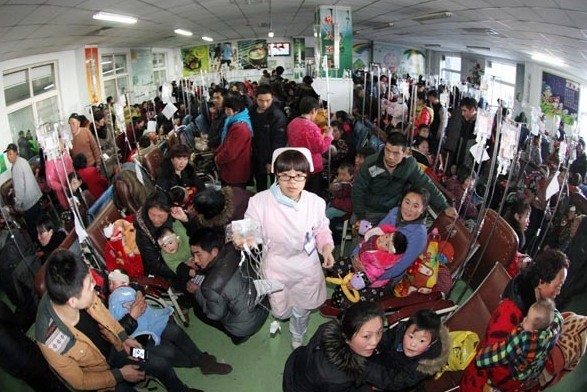

People crowd into the infusion hall of the People's Hospital in Ganyu County, Jiangsu province, on Jan 4. Si Wei / for China Daily
Future medical bills get top priority among Chinese savers, nearly half of whom are also actively saving for their children's futures, according to a report released on Thursday by research firm Nielsen Holdings NV.
The Nielsen Global Survey of Saving and Investment Strategies polled more than 30,000 Internet respondents in 60 countries to evaluate how consumers prepare for current and future expenses.
When it comes to medical care, the percentage of global respondents who are already saving is much higher than the portion who plan to save in the future.
In China, the gap is particularly huge, with 64 percent actively saving for health issues, compared with 34 percent who plan to save in the future.
"The 30-percentage-point gap between active savers and future savers for health issues indicates the strong and growing willingness of Chinese consumers to invest now to keep healthy," said Kevin Wang, director of Nielsen China.
Wang added that some of the funds accumulated through saving for health issues will likely be diverted from paying for huge medical bills to spending more on products and services, which also will boost China's health and consumption market.
Respondents in China are likely to employ diversified strategies in saving for health issues, with local currency, whole life insurance and pure term life insurance among the choices.
"Saving up for better health care is [a natural goal] as we all want to stay healthy and live longer, especially after we've made enough money," said Chen Quan, 52, a book retailer in Shanghai. He said that more middle-aged Chinese have been spending much more money on preventive health care, as well as life insurance.
Nearly half of the Chinese respondents are actively saving for the education and other expenses of their children.
"With only one child in the family and fierce competition in the job market, Chinese parents all try their best to ensure their children receive a good education from an early age, including expenses beyond compulsory education," said Wang.
As with health saving, Chinese consumers use multiple investment products to fund their children's futures. Local currency is the most common method, chosen by 66 percent of respondents, followed by 45 percent who chose children's education funds.
"Spending money on children's education and other expenses will be the major costs for my family in about three years as we are willing to offer the best for our kids in the future," said Ye Qingzhou, 33, a businessman in Wenzhou, Zhejiang province, who is the father of two girls.
Ye added that he bought education insurance for his daughters when they were born, and each will get about 300,000 yuan ($49,537) when they turn 18.
According to the study, 82 percent of Chinese respondents believe they will achieve all their financial goals for the future, with 35 percent saying their current planning will be enough.
Another 47 percent said they will need to closely monitor and adjust their investments from time to time to best meet their financial expectations.
"Preparing for one's financial future or for the unexpected is a tradition among Chinese consumers,"said Wang.
China's health care costs increase: official data
2013-06-19China promotes health care reform
2013-01-10China pushing universal health care
2012-11-02China to improve health care for elderly
2012-10-11Copyright ©1999-2018
Chinanews.com. All rights reserved.
Reproduction in whole or in part without permission is prohibited.